- Home
- Tony Roberts
The Commissar
The Commissar Read online
CASCA
THE COMMISSAR
This is a book of fiction. All the names, characters and events portrayed in this book are
Fictional and any resemblance to real people and incidents are purely coincidental.
CASCA: THE COMMISSAR
Published by arrangement with Eastaboga Entertainment, Inc.
Printing History
2019
Americana Books
A Division of Lonewolf Group Inc.
Copyright 2019 Eastaboga Entertainment, Inc.
Cover Design by John Thompson
All Rights Reserved
Including the rights to reproduce this book or portions thereof
In any form or format without permission.
For information contact
Americana Books
P.O. Box 210314
Nashville TN 37221
ISBN 978-1513646985
Printed in the United States of America
TONY ROBERTS
My mother was my unlikely route into becoming a Casca fan. On one shopping trip she bought me a copy of Casca 3: The Warlord. 3 was not a great place to start but I devoured it anyway, loved the character and the sense of history made real. Then followed 13 years while I collected the original series; without the help of the internet. Then what to do, the series was over. I started to write my own Casca novels, and set up my website www.casca.net, building a worldwide base for Casca fans and contacts.
My first Casca novel, Halls of Montezuma, was published in 2006. The Commissar is my twenty-fourth novel in the series.
I also write three other series of books, a high fantasy series ‘Kastania’, another fantasy series ‘Dark Blade’ and a fictional rock band biopic called ‘Siren’. Details of all these books can be found on my author website www.tonyrobertsauthor.com
I live in Bristol, with my partner Jane and a fluffy cat called Cassia.
PROLOGUE
River Sereth, Romania, 7 January 1917.
Cold, wet, dispirited. The retreating army looked a sorry sight as it shuffled in a ragged and loose column along the iron-hard frozen mud road towards the river crossing. The men were walking with heads down, uncaring, red-rimmed eyes speaking of too many days spent without sleep. They wore defeat about them like a grim coat, holding onto the last vestiges of self-respect and discipline.
Romania had been defeated, conquered. In a short but overwhelming campaign that had lasted a mere three months, the Central Powers of Germany, Austria-Hungary and Bulgaria had defeated the Romanian army, driven them back into their territory, and then gone on to occupy the vast majority of the country. Now what was left, shuffled in a disheartened manner to the River Sereth.
Standing aside from the general wave of smelly, steaming, dejected mass was one man on the roadside, smoking a cigarette, his light blue eyes scanning the men passing by before him. Like them, he was in Romanian uniform, that of a corporal, the light blue colored wool outfit with the soft peaked cap. Or rather, it had once been light blue, but now, like most of the others, it was muddy, stained and had more than a few rips, tears, and holes in it. Many of them had been repaired by the man who was more than a little skilled at repair, but there was only so much one could do.
He had brown leather boots, laced up to his ankles, and puttees were tightly wrapped from them to the bottom of his trousers, just below the knees. He wore a backpack and a water bottle, and he held his rifle in one hand, butt resting on the ground while he casually smoked with the other. The rifle was clean and looked in fine working order, which in fact was what it was. The man, Casca Rufio Longinus, knew how to look after his weapon, whether it be a sword or rifle.
This particular weapon was a Mannlicher M93 bolt-action rifle that used a 5-round clip. His bayonet was in its sheath strapped to his left hip.
Casca’s eyes, although red-rimmed with tiredness, were still alert, unlike so many of the men wearily making their way to the bridge over which was the soil of Imperial Russia. Casca finished his cigarette, dropped it to the ground and rubbed it to bits with his boot. One last exhalation and he shouldered his rifle and joined the line of men making their way off their sacred soil.
He didn’t feel the same about that; after all, he wasn’t Romanian. He was Roman, but that wasn’t the same. Unlike his fellow sufferers, he wasn’t twenty, or thirty. No, he was one thousand nine hundred and, oh, a bit. His scar running down his face was his most noticeable feature, one he’d got from a whore before becoming immortal, made so by a dying Jesus on the cross in retaliation for spearing him. So now he was cursed to fight wars and conflicts, having done so ever since.
This current war had seen him fight for the British on the Western Front until he’d been badly wounded, then as a member of the Anzacs at Gallipoli, until he’d deserted. Then he’d fled through Bulgaria to Romania, which at that time had been neutral, but very shortly after he got to Bucharest, that country joined in the war by attacking Austria-Hungary. Casca had been caught up in it and had fought in Transylvania until November, then Falkenhayn’s Germans had broken through and it had been a case of constant retreat ever since.
He reached the other side of the bridge and saw a group of Russians looking at them with a mixture of pity and disgust. Casca knew why; the Russians had been having a rotten time of it themselves with horrendous losses and the last thing they’d wanted had been to extend their lines down to the Black Sea, but there you were. Life was a bitch.
It was all a mess and it was a war of mass slaughter, sending men like him out onto unprotected terrain against dug in men armed with machine guns. He’d been in many wars and this one was one of the worst. It seemed nobody had any idea how to do anything other than order another mindless attack.
He was sick of it all, even with his compulsion to fight wars. If there was sense in it or a good cause, then yes, but this was just a gigantic mincing machine. Technology had run far too much ahead and people were struggling to find an answer.
A Russian was watching them silently from behind a wooden fence on the side of the road, smoking. Casca stepped out of line and waved at him for one, offering a small bar of chocolate he’d saved for currency.
The Russian considered the bar for a moment, then looked at his diminishing number of cigarettes. “Sorry, I’ve not got many left,” he said in Russian.
“No worries,” Casca replied in the same tongue. “So, what’s it like this side of the border? Same kind of shit?”
The Russian, a short, dark-eyed man with a broad nose, cackled, showing tobacco-stained teeth. “Friend, you speak like a Finnish whore.”
“At least I don’t look like one.” Casca recalled the Russians obsession with prostitutes in their daily list of insults. “And I’m not a whoreson either.”
The Russian doubled up, choking with mirth. It had been a long time since anyone had come by with a sense of humor. This war destroyed that in no time. “Lukin,” he introduced himself, offering his hand, “Anatolii Grigorievitch. Twelfth corps, eighth army of the Romanovs, may their name be damned forever.”
Casca decided to play it coyly. “Kaskarov, Roman Rufievitch.” He had thought up the name quickly.
“You’re Russian?” Lukin asked, surprised.
“Yes, captured in 1915 during the German’s big attack, sent to an Austrian prison, escaped, found my way to Romania and fought for them. Well, they’re fucked. Might as well rejoin the army of the Romanovs.”
“We’re not much better,” Lukin said gloomily. “There’s talk of giving up and going home. We’ve suffered so much, as you probably know. After that big attack last Summer we’ve just about had enough. The generals don’t care about us soldiers, the Romanovs don’t care either, and all we get are the same old rubbish about charging across o
pen ground sometimes without even having a rifle! I’ve seen men with none having to wait until a comrade around them with a rifle is hit before they can get one! The only general worth anything is Brusilov.”
Casca had heard of Brusilov. He had been the architect of the offensive the last Summer and he had brought in some innovations, like advance squads of infiltrators to cut wires and provide a sudden shock attack from close quarters. He had also attacked not in one or two concentrated places, but in many places all along the line, probing for weaknesses. That had been a huge change, for up to then the general attitude of the aged generals was to attack the strongest point, a brainless attitude guaranteed to mount up casualties. It had broken the Austrian army but the Germans had shored up the collapse and even Brusilov’s attack had foundered eventually and then been pushed back.
“So what is everyone doing about it?”
“There’s talk of mutiny, desertion, revolution.” Lukin jerked his head to Casca to lead him off to one side. Making sure nobody was around to overhear, he leaned close to Casca. “Can you read?”
Casca was about to snap back rudely, when he remembered the average Russian soldier was illiterate. Four out of five couldn’t read, thanks to outdated censorship methods used by the ruling elite to ensure the peasantry remained where they were. Educate the masses and risk revolution. “Yes, I can.”
The Russian fished inside his greatcoat and pulled out a newspaper. He passed it to Casca. “Read this, but don’t let any of the officers catch you. You could end up being shot.” Lukin walked off, telling Casca to find him after he’d read the paper in the camp by the river’s edge.
Casca sat down behind an abandoned wagon and opened the paper. The name of the paper was Pravda. Truth. He began to read it, and his eyes widened as he went on…
CHAPTER ONE
Casca reckoned the fighting spirit of the Russian army would be put to the test that morning. He stood in the trench alongside the others of his unit, the twelfth corps, waiting for the word, the command, to attack.
In the seven months he’d been with the Russians, he’d come to realize just how badly motivated, run and equipped they were. Small wonder they had fared so badly in the war so far. What concerned him more than anything else was the fact they were not a united people, nor a united army. In centuries past the Russian leaders, the tsars, had ruled with an authoritarian fist, backed by the nobility, and the majority of the people were mere serfs, peasants, held to the land.
Casca had seen that in 1812 when he’d been part of Napoleon’s Grande Armee, fighting through from Poland all the way to Moscow and back. The Russians had thrown masses of men at the French, and although inferior in quality, had prevailed due to their numbers and the major fact that the weather had destroyed Napoleon’s plans.
The Russian army was always made up of peasants conscripted to serve, and to many it was a death sentence, and quite often villages held wakes when they had been called up. Now? Once the initial enthusiasm for war had been brutally crushed in the 1914-15 campaigns, it was clear to all that the system was utterly corrupt, inefficient and served by people who had no other interest than to themselves.
The tsar’s court was made up of rival factions interested in pushing their own agenda forward rather than serving the state and improving the lot of the masses. In times gone by Casca reckoned Russia could have gotten away with it, but not now. No, not in a time when other countries outstripped them in education, literacy and a more all-inclusive political system. It made everyone much more inclined to fight the same cause.
Here in Russia that was not the case. Their defeat to Japan in 1905 was a wake-up call to the tsar and his nobility that things were dreadfully wrong, and it had nearly brought them down. Only the army had prevented that, but now the army wasn’t backing them and it had ended rather predictably.
Casca remembered the day well; he’d been listening to one of the men complaining as was usual about the officers and their lack of caring when another had come running up, breathless, his eyes wide with excitement. “Comrades! Comrades!” he had shouted out, forgetting for a moment that such greetings were frowned upon by the officers. “Have you heard the news? Divisional HQ has just received a telephone message to say the tsar has abdicated!”
That had been in March, and in the surreal atmosphere that had gone on after that, nobody really knew what was going to happen. Most of the soldiers wanted to go home, most of the officers wanted to stay and continue the war. Desertions were bleeding the army dry and trains were rolling away from the fronts packed full of men, while those returning were almost empty.
A provisional government had been installed by the Russian Duma, their parliament, but now the biggest headache they had were the Bolsheviks led by one Vladimir Ilyich Ulyanov, known better by the name Lenin, who agitated for peace and an end to the ruling elite and a revolution of the workers and peasants.
Now Casca had read all their propaganda in their paper Pravda, and thought some of what Lenin and the Bolsheviks made sense, but he doubted it was all that practical. They advocated a world revolution from the bottom against those who ruled. It would probably find fertile ground in a society where the majority were uneducated but not where people were not so easily guided by slogans.
They promoted a society where people were equals. A community of comradeship. So they were being called Communists. Casca remembered the French uprising in 1870 after their shattering defeat at the hands of the Prussians. Then, the Paris commune rose up and tried to impose a more egalitarian society. These Communards, as they called themselves, were brutally crushed by the new French regime.
And again, Casca recalled the great slogans of the revolutions in France in 1789 and ’92. Fraternity, equality and liberty. Oh yes, Casca had heard that and gone running to that wonderful-sounding new society, kept alive by terror and war. Eventually it had been brought down from within, not without, and the instigation of a new emperor, Napoleon, had ended that dream.
So now here, Russia. The tsar had gone, along with his corrupt state framework of sycophants and useless hangers-on, and a provisional government was in its place, led by a collection of socialists under Alexander Kerensky. Kerensky wanted to continue with the war, to honor the alliance with France who remained locked with Germany on the Western Front. Lenin and his Communists and Bolsheviks did not and constantly undermined the new government with calls to end war and promote fraternity.
Fraternity. Casca smirked cynically. Oh yes, Lenin and his cronies thought by allowing the revolutionary soldiers in the Russian army to fraternize with the soldiers of Germany and Austria, the words of revolution would spread to those armies and they, too, would throw down their weapons and go home and commence a revolt against… who was it they said? Oh yes, the bourgeoisie. They, the downtrodden peasantry and workers, were the proletariat.
All a load of shit, of course. Who the fuck would take that seriously? Really? Like by shouting out to the Germans to join them in revolution, they would? The trouble was the majority of the Russian peasantry truly believed it; they couldn’t read, so they listened to the vocal minorities who were filled with revolutionary fervor.
Some divisions were rendered incapable of fighting; the Russian army further north was particularly badly affected and weren’t able to attack. Kerensky insisted they did, and the date had been set. Here, further south, they were further away from the center of the revolution, Petrograd, and were less affected. Also, here, opposite the Austrian-held territories of Bukovina and southern Galicia, they were facing mostly Austrian troops and they weren’t worth a damn. Austria had a paper army after its horrendous losses of the past three years, and they’d only got rid of their Chief Butcher Conrad von Hotzendorf a year ago. Three years too late.
Casca had no enthusiasm for the coming assault. The Russians had no tanks, that new device the British had brought to the battlefield, an armored fighting vehicle. They had hardly any reserves, nor enough to be guaranteed a realistic chance of succ
ess. He didn’t know why Kerensky was insisting, for it would only be yet another bloodbath and what was left of the fighting value of the Russian army would be snuffed out and this would all play into the hands of the Communists.
Right now, from where he stood, nervously fidgeting with his rifle, the Communists had the right idea. Perhaps he ought to add his voice to theirs and get this stupid pointless war to end. He was all for war to settle an argument if all other means failed, but he wasn’t in favor of merely sending soldiers to slaughter. It was pointless. End it, and train an army up to be able to fight. This army wasn’t capable.
A soldier he was, and a soldier he’d always been. Accordingly, he took pride in his profession. He really hated slaughtering soldiers for no good reason, and everything he saw before him was heading that way. When you have soldiers holding meetings to decide whether officer’s orders should be followed or not, then any discipline any army must have was gone.
Many soldiers were faking injury to avoid being included in the battle. Before, such actions would have incurred the death penalty but now that had been abolished by the revolutionary committee in Petrograd. In addition doctors were threatened with being murdered by angry soldiers unless they confirmed the ‘injury’ was real, so thousands of soldiers who would have been in the front line were not there.
Russia was sick of the endless slaughter.
Casca was not looking forward to the next few hours – if he avoided being hit. He had taken pains to be equipped as well as any of his comrades, either picking up discarded equipment that had been carelessly left in the trenches, or by taking it from those who refused to fight.
One such individual had been a big angry man from some village on the Volga. This man had vociferously argued against fighting and that all his comrades throw down their arms and go home. Casca had then suggested that the honored comrade give him his rifle since he no longer needed it.
The big man had refused, whereupon Casca had smashed his nose with a huge punch and sent the man on his ass. His circle of colleagues had rushed forward, enraged, but Casca had aimed his newly-acquired rifle at them and vowed to kill the first who came at him, then slowly dismember the rest.

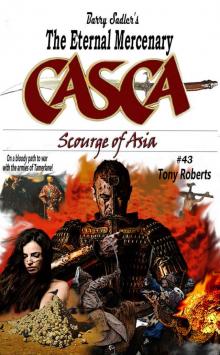 Casca 43: Scourge of Asia
Casca 43: Scourge of Asia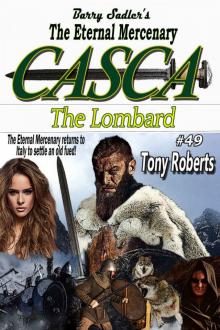 The Lombard
The Lombard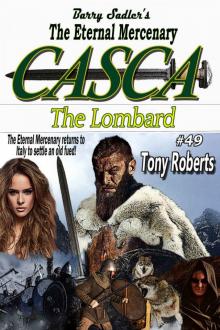 Casca 49: The Lombard
Casca 49: The Lombard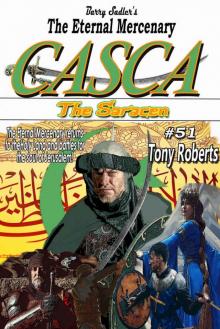 The Saracen
The Saracen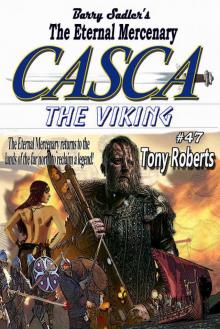 Casca 47: The Viking
Casca 47: The Viking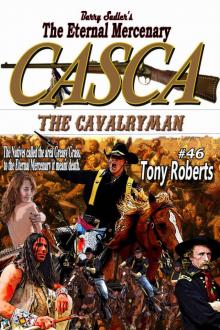 Casca 46: The Cavalryman
Casca 46: The Cavalryman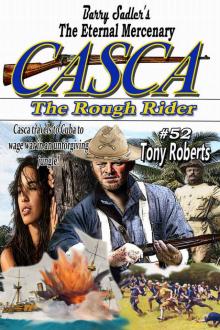 Casca 52- the Rough Rider
Casca 52- the Rough Rider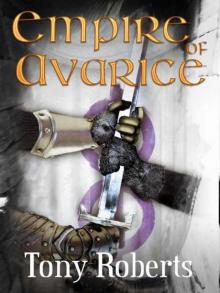 Empire of Avarice
Empire of Avarice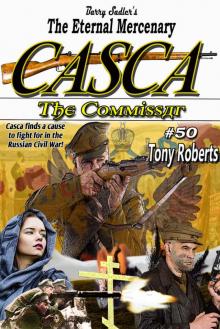 The Commissar
The Commissar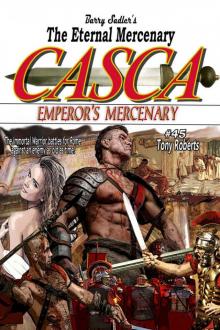 Casca 45: Emperor's Mercenary
Casca 45: Emperor's Mercenary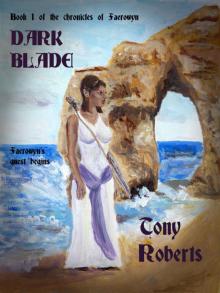 Dark Blade
Dark Blade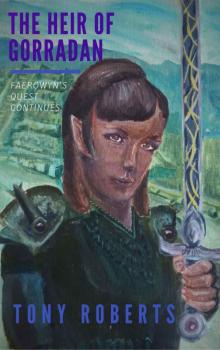 The Heir of Gorradan (Chronicles of Faerowyn Book 2)
The Heir of Gorradan (Chronicles of Faerowyn Book 2)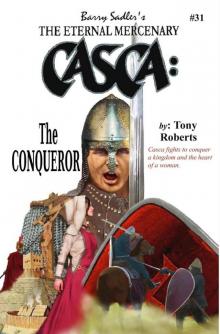 Casca 31: The Conqueror
Casca 31: The Conqueror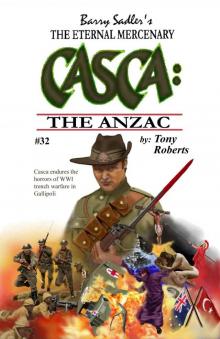 Casca 32: The Anzac
Casca 32: The Anzac The Anzac
The Anzac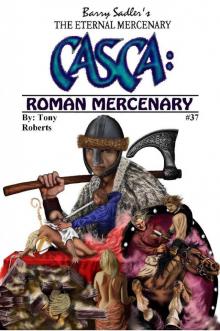 Casca 37: Roman Mercenary
Casca 37: Roman Mercenary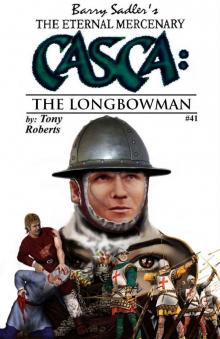 Casca 41: The Longbowman
Casca 41: The Longbowman The Longbowman
The Longbowman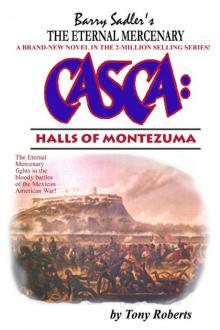 Casca 25: Halls of Montezuma
Casca 25: Halls of Montezuma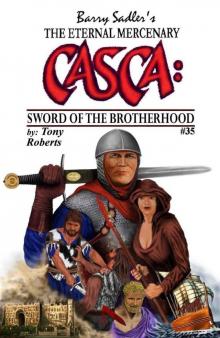 Sword of the Brotherhood
Sword of the Brotherhood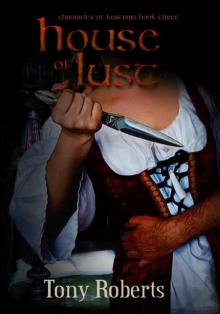 House of Lust
House of Lust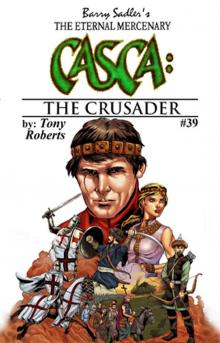 Casca 39 The Crusader
Casca 39 The Crusader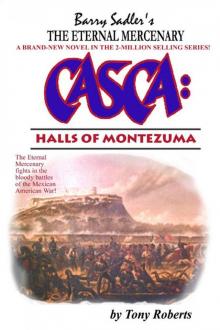 Halls of Montezuma
Halls of Montezuma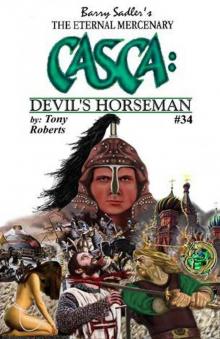 Devil's Horseman
Devil's Horseman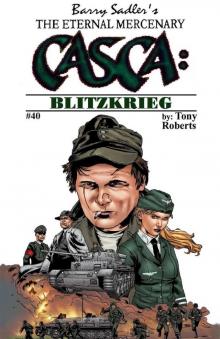 Casca 40: Blitzkrieg
Casca 40: Blitzkrieg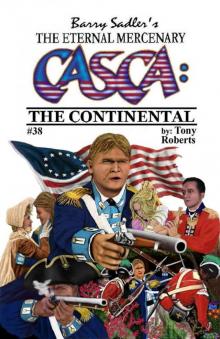 Casca 38: The Continental
Casca 38: The Continental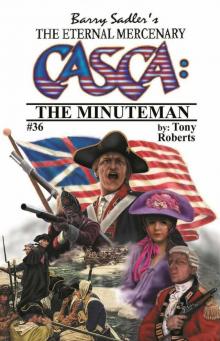 The Minuteman
The Minuteman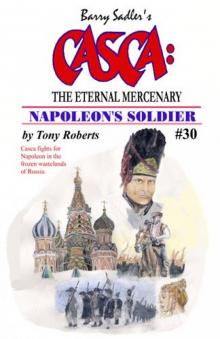 Napoleon's Soldier
Napoleon's Soldier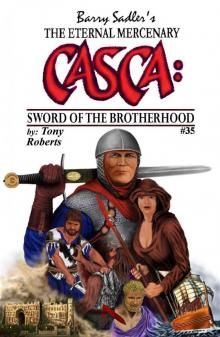 Casca 35: Sword of the Brotherhood
Casca 35: Sword of the Brotherhood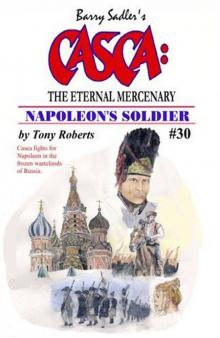 Casca 30: Napoleon's Soldier
Casca 30: Napoleon's Soldier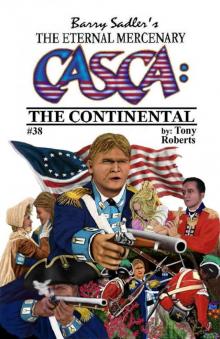 The Continental
The Continental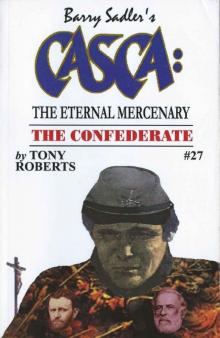 The Confederate
The Confederate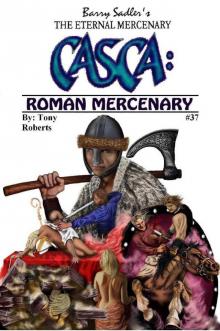 Roman Mercenary
Roman Mercenary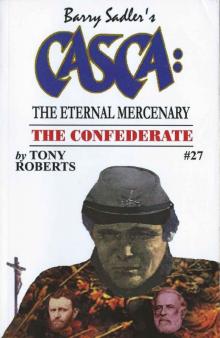 Casca 27: The Confederate
Casca 27: The Confederate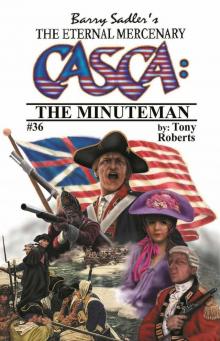 Casca 36: The Minuteman
Casca 36: The Minuteman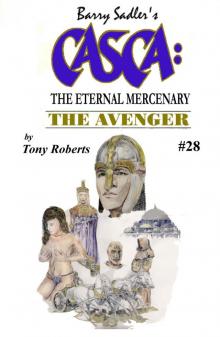 Casca 28: The Avenger
Casca 28: The Avenger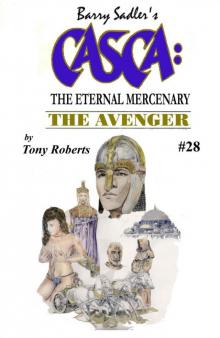 The Avenger
The Avenger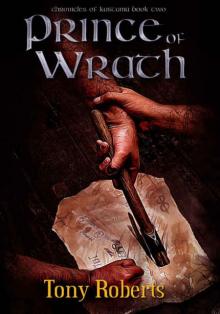 Prince of Wrath
Prince of Wrath